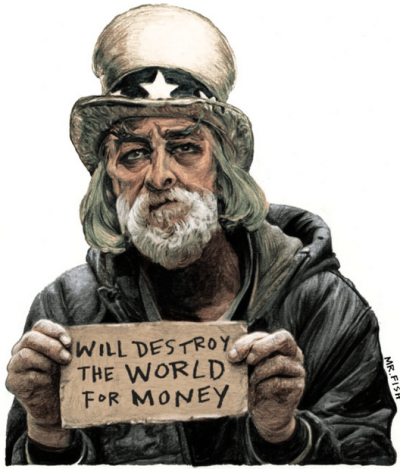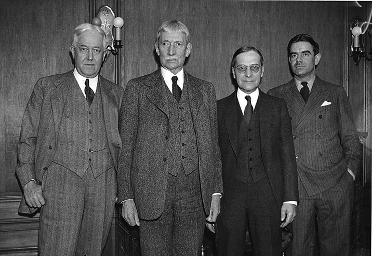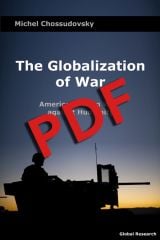Will the Decline of the U.S. Empire Usher in a More Peaceful World Order, or Will New Empires Emerge that Are Just as Lethal and Exploitative?
Review of Alfred W. McCoy’s new book "To Govern the Globe: World Orders & Catastrophic Change"

All Global Research articles can be read in 51 languages by activating the “Translate Website” drop down menu on the top banner of our home page (Desktop version).
To receive Global Research’s Daily Newsletter (selected articles), click here.
Visit and follow us on Instagram at @globalresearch_crg and Twitter at @crglobalization. Feel free to repost and share widely Global Research articles.
***
History does not bring confidence that peace and genuine human equality will prevail on Planet Earth anytime soon.
Nevertheless, a new China century would likely be an improvement over the American, British and Spanish empires
In early February, just before the start of the Ukraine War, Russian President Vladimir Putin and Chinese Premier Xi Jinping had a historic meeting in which they vowed to increase trading ties and to help one another to stand up to the U.S..
At a forum in Sochi a few months earlier, Putin said that the U.S. was accelerating the process of its decline with a string of mistakes “typical of an empire.” These mistakes included the implementation of ‘…sanctions against Russia and other nations which undermined trust in the dollar as the world’s universal currency.’
According to Putin, “an empire always thinks that it can allow itself to make some little mistakes, take some extra costs, because its power is such that they don’t mean anything. But [with] the quantity of those costs, those mistakes inevitably grow.”
The U.S. Empire had been riding high in 1991 after the collapse of the Soviet Union but then spectacularly overreached following the 9/11 attacks in Afghanistan and Iraq.
The total cost for the Afghan war alone reached $2.2 trillion.
Jeffrey Eggers, a White House staffer and Navy SEAL veteran, asked a government investigation in 2015:
“What did we get for this effort? After the killing of Osama bin Laden, I said that Osama was probably laughing in his watery grave considering how much we have spent on Afghanistan.”

Source: laprogressive.com
Putin may soon be laughing too if the U.S. continues to escalate its “foreign entanglement” in Ukraine wasting lives and vast sums of money promoting another losing cause.
A Promise Unfulfilled
Alfred W. McCoy’s new book To Govern the Globe: World Orders & Catastrophic Change (Chicago: Haymarket Books, 2021), seeks to place the rise and fall of the American Empire in world-historical context.
Like other empires throughout history, the American one showed great “promise” at the beginning. With the defeat of Nazi Germany in World War II, it seemed that the age of competing empires, closed imperial trade blocs and secret alliances would soon give way to an international community of emancipated colonies, sovereign nations, free trade and peace through law.
Washington’s new visionary world order took form at Bretton Woods, New Hampshire, in July 1944 where 44 Allied nations forged a new financial system led by the World Bank that would secure so-called “global prosperity,” and at San Francisco in June 1945, where the UN Charter was drafted.

President Harry S. Truman and the entire American delegation look on as Senator Tom Connally (D-Tex.) signs the United Nations Charter in San Francisco, June 26, 1945. [Source: ge.usembassy.gov]
Three years later, former First Lady Eleanor Roosevelt promoted a Universal Declaration of Human Rights at the UN General Assembly, which proclaimed that “all human beings are born free and equal in dignity and rights. They are endowed with reason and conscience and should act towards one another in a spirit of brotherhood.”

Eleanor Roosevelt with Human Rights declaration. [Source: history.com]
The idea for the Universal Declaration of Human Rights and UN Charter derived from Elihu Root, the U.S. Secretary of State from 1905 to 1909, who championed an international court as an alternative to armed conflict.
Yet, Root was a former corporate lawyer who oversaw the bloody suppression of an anti-colonial revolt in the Philippines and championed military interventions in Cuba, and Nicaragua. In World War I, Root led a group of financiers, industrialists, and corporate lawyers who established the Council on Foreign Relations in New York City—the premier forum for the promotion of an imperialist foreign policy.

Founding Fathers of the Council on Foreign Relations. Elihu Root is second from the left. [Source: researchgate.net]
Unfortunately, the U.S. repeatedly violated the ideals of its own foreign policy rhetoric—a narrative that nonetheless serves its purpose: to distract and mislead the public. The drive to acquire overseas military bases and access raw materials led to the waging of aggressive wars that yielded a devastating impact. None more so than in the Pacific theater of World War II where the U.S. Air Force under General Curtis LeMay razed almost every Japanese city and dropped two atomic bombs that killed at least 250,000 people.
McCoy writes that,
“at the core of U.S. power was an unmatched military with hundreds of overseas bases that circles the globe, a formidable nuclear arsenal, massive air and naval forces and many client armies.”
The Central intelligence Agency (CIA), according to McCoy, served as the critical mechanism for the resolution of a contradiction that lay at the heart of Washington’s world system: How could the U.S. intervene in the international affairs of independent nations in the exercise of its global hegemony without being seen to violate their inviolable sovereignty under the UN Charter?
The answer was to do it covertly, using the agency’s (at least theoretically) traceless tools to invisibly compromise the sovereignty of countless nations.
These tools included election manipulation, psychological warfare, organization of coup d’états and many other forms of subversion. During the first decades of the Cold War, a national leader critical of the U.S. Empire could face a CIA-sponsored coup that left him locked up for life (Iran), forced into exile (Guatemala), tortured to death (Congo), or left murdered on the capital streets (South Vietnam).
Secret interventions ultimately fractured delicate political balances and plunged developing world nations into protracted instability marked by endemic violence.
As the heavy costs of the agency’s covert capacity accumulated, George Kennan of the State Department, the father of the Cold War containment strategy, called the CIA’s creation “the greatest mistake he ever made.”
“They Make a Desolation and Call It Peace”
The CIA’s dark side was evident in Iran where the training of secret police officers in torture techniques bore the marks of the agency’s program of secret research into psychological torture that it would, in defiance of international conventions, disseminate among allies worldwide.

Museum displaying torture by SAVAK under the reign of the Shah, a U.S. client installed in the CIA’s 1953 coup. [Source: threadreaderapp.com]
According to McCoy, the CIA’s recurring complicity in torture and backing of coups—all banned under Article 5 of the UN’s Universal Declaration of Human Rights—highlighted “the stark duality between Washington’s principles and its exercise of power.”
Throughout the 1960s and early 1970s, Washington deployed the CIA to terrorize South Vietnamese villages through the Phoenix Program, which was responsible for 40,994 extrajudicial executions.
A Pentagon study found that only three percent of suspects killed, captured, or rallied were Communist Party members above the district level, with the program having been infiltrated by the enemy’s counterintelligence service.

U.S. GIs with Vietnamese prisoners captured under the Phoenix Program. [Source: uncensoredhistory.blogspot.com]
CIA interventions led to further bloodbaths in Indonesia in 1965, when a CIA-driven coup culminated in the deaths of more than a million people, and in Laos and Cambodia, where massive U.S. bombing followed deadly clandestine warfare.

U.S. troops amidst devastation in Cambodia after illegal invasion by Nixon administration in 1970. [Source: history.com]
Yet more atrocities were committed in South America’s Southern Cone, where Operation Condor was modeled on the Phoenix Program, and in Afghanistan, where the CIA provoked a Soviet invasion by arming Islamic jihadists under the $500 million Operation Cyclone.
McCoy writes that “a survey of the wastelands left by this [Afghanistan] and other CIA secret wars brings to mind what the ancient Scots chieftain Calgacus once said of the Roman Empire: “They make a desolation and call it peace.”
“Arms of Science over Barbarians”: The British Empire
The destructiveness of the American Empire was preceded by other empires which also claimed a mantle of moral leadership while sowing suffering, death and destruction for plunder.
Inspired by the Enlightenment’s ideals of liberty and Protestant principles of humanity’s equality before God, Great Britain in its heyday was committed to extirpating the slave trade—banning human trafficking by an act of Parliament in 1807, abolishing slavery in its own Caribbean colonies in 1833, and deploying the Royal Navy for nearly 80 years to suppress the slave trade.

Source: historyhit.com
McCoy writes that the ambitious anti-slavery campaign “became a defining aspect of the British world order.”
However, by imposing direct colonial rule that was justified under the guise of white racial superiority, the British created new forms of human bondage, depriving their subjects of due process under the law, freedom of expression, and the fundamental right to choose their own government.
On colonial plantations in northern India, armed musketeers recruited thousands of workers who were paid about half of free market wages and suffered a mortality rate of 25 percent. Scholars branded this indentured labor a “new system of slavery.”
The British empire’s advance man, Cecil Rhodes, created a model for South Africa’s apartheid system after forming DeBeers Mining Company to monopolize the diamond mines at Kimberley, where he constructed closed compounds with circumscribed civil liberties for Black workers.
To break the powerful Matabele kingdom to extend his diamond charter, Rhodes dispatched mercenaries armed with Maxim machine guns which cut down 1,500 African fighters.
The slaughter in Matabeleland was replicated in the Sudan, where British troops under the command of General Herbert Kitchener killed 10,800 Wahabist Islamic fighters while losing only 49 of their own men.
A young war correspondent named Winston Churchill surveyed a battlefield littered with body parts and called it, with unintended irony, “the most significant triumph ever gained by the arms of science over barbarians.”
These latter comments epitomize the moral righteousness guiding British imperialism—which was similar to its American counterpart.
Iberian Age
Another parallel was with Spain in the 15th and 16th centuries which, according to McCoy, “created the first world order worthy of the name, one comingling commerce, conquest, and religious conversion.”
The gap between rhetoric and reality was detailed in Bartolomé de las Casas’ Short Account of the Destruction of the Indies, which depicted Spanish soldiers unleashing attack dogs to feed on Amerindians, chopping off their arms and hanging dozens on racks over roaring flames.
With growing suspicion of unrest at home, 20,000 spies burned 2,000 suspected heretics during the reign of King Philip II (1556-1598), banned books and stifled scientific inquiry.

Suspected Protestants being tortured as heretics during the Spanish Inquisition. [Source: Britannica.com]
Corruption of Democratic Values
The latter repression was mirrored in the U.S. by the growth of repressive policing techniques honed on colonial frontiers, growing militarization of public life, and the growth of an unprecedented penal apparatus that treated minority groups like colonial subjects—with no rights.

The Louisiana State Penitentiary is a maximum-security prison farm in Louisiana. It is named “Angola” after the former plantation that occupied this territory; The plantation was named after the origin country from which many were kidnapped and forcibly transported. Despite the 13th Amendment of the U.S. Constitution, which prohibits involuntary servitude, this right does not apply to convicted inmates. [Source: fristartmuseum.org]
While the pursuit of empire abroad reflects plutocratic interests, it also corrupts democratic values at home and fuels greater state repression that is usually self-defeating.
The Dawn of the Chinese Age
McCoy predicts the dawn of a new multipolar era in which the Chinese supplant U.S. global imperial power by the year 2030 in a transformation exacerbated by the ravaging impact of climate change.
With the American dollar no longer serving as the world’s currency reserve, the U.S. Empire will likely remain only as a hemispheric military power, forced to shut down many of its overseas military bases.
Over the past two decades, while Americans were mired in their endless wars, Beijing was using its growing capital reserves to build a tricontinental infrastructure under the One-Belt-One Road initiative that will incorporate great swaths of Africa and Asia into its version of the world economy, lifting many millions out of poverty.

Source: ejinsight.com
Prior to the COVID-19 pandemic, China’s economy grew at an average of 10% per year over a 40-year period—the fastest sustained rate ever recorded by any country. Its military capabilities grew considerably in this period, with China now poised to challenge the U.S. Navy’s 70-year dominion over the Pacific Basin.
Given China’s Tienanmen Square massacre and harsh treatment of Tibetan and Uighur minorities, lack of press freedom and defiance of the doctrine of the open seas sanctioned by a UN convention, McCoy does not expect China to be a benign imperial power.
Nevertheless, China, so far, seems less prone to incite spectacular violence and military adventurism, less prone to start foolish wars and more unlikely to destabilize countries to the extent that U.S. rulers have done with the CIA and the Pentagon.
*
Note to readers: Please click the share buttons above or below. Follow us on Instagram, @globalresearch_crg and Twitter at @crglobalization. Feel free to repost and share widely Global Research articles.
Jeremy Kuzmarov is Managing Editor of CovertAction Magazine. He is the author of four books on U.S. foreign policy, including Obama’s Unending Wars (Clarity Press, 2019) and The Russians Are Coming, Again, with John Marciano (Monthly Review Press, 2018). He can be reached at: [email protected].
Featured image is by Mr. Fish from cuencahighlife.com
 The Globalization of War: America’s “Long War” against Humanity
The Globalization of War: America’s “Long War” against Humanity
Michel Chossudovsky
The “globalization of war” is a hegemonic project. Major military and covert intelligence operations are being undertaken simultaneously in the Middle East, Eastern Europe, sub-Saharan Africa, Central Asia and the Far East. The U.S. military agenda combines both major theater operations as well as covert actions geared towards destabilizing sovereign states.
- ISBN Number: 978-0-9879389-0-9
- Year: 2015
- Product Type: PDF File
Price: $9.40 (sent directly to your email)

